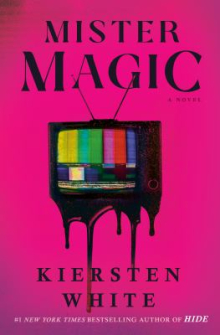
Val has lived on the ranch for as long as she can remember. In fact, she has no memories of when she wasn’t living here, in rural Idaho, with her father. She teaches riding to the locals, but rarely leaves beyond supply runs to a local town. Her entire life is built around her father and a few regular ranch hands. Everyone else is transitory, staying just long enough to learn what they need.
When Val’s father dies, she is faced with a future that is not only unwritten, but it is unconsidered. Val has never contemplated a life anywhere other than the ranch. Her father told her that her mother died before they came to the ranch. She has no other family. She has nowhere else she wants to go and no reason to go anywhere else.
During the wake for her father’s funeral, Val is approached by three men. They all claim that they, along with Val, were the stars of a children’s television program called Mister Magic in the late 80s and early 90s. Val is skeptical. She does a few quick searches online and finds quite a bit of speculation about the show, but there are no images or videos from it. There are no scanned script pages. Nothing of the show seems to survive except the memories of the people who watched. Val, however, even though she was supposedly on the show, has no memories of it at all.
The men tell Val that they are on their way to a reunion of the cast members. Val really has no interest in a reunion because she has no way to participate since she has no memories of the show herself. But she is intrigued by the possibility that she may be able to learn about a childhood she does not remember. Then one of the men, Isaac, tells Val that the reunion is occurring near where Val’s mother lives and Isaac would be happy to take Val to see her. Val’s mother is alive! Why would her father have lied to her about this? Did he lie about anything else? To find out, all Val has to do is get into a car with three strangers and drive off into the Utah desert. . .
In Mister Magic, Kiersten White plays with memories. Memories that are clear and sharp or vague and ephemeral. Memories that have been intentionally forgotten, and those that we can’t rid ourselves of no matter how hard we try. She also explores how people with shared experiences may, and often do, manifest memories that have almost nothing in common.
White illustrates how trauma experienced as a child can manifest in adulthood, following and affecting someone in ways they may never fully realize themselves. The source of this trauma is often actions taken by adults with the best of intentions. She also demonstrates how children growing up in various religions are subjected to very specific forms of trauma. While White is referencing a very specific belief system in Mister Magic, her observations cut across denominations.
Her novel centers around a children’s television program that many, many people claim to have strong memories of watching, while others may have only a vague recollection. It has become a bit of an urban legend, with no extant artifacts of any kind, whether audio, visual, or physical. White expertly weaves the public’s memories, speculations, nostalgia for the past and demands that the show be brought back throughout the novel. All of these emphasize the fragility of memories, how differently the same experience can be remembered by different individuals, and the hazards of turning one’s gaze toward the past, longingly, without keeping an eye on the present and the future.
Mister Magic is a subtle, but terrifying, novel. White maintains a sense of unease throughout that builds to a disturbing conclusion, and she proves that sometimes the scariest monsters are those hiding in plain sight.